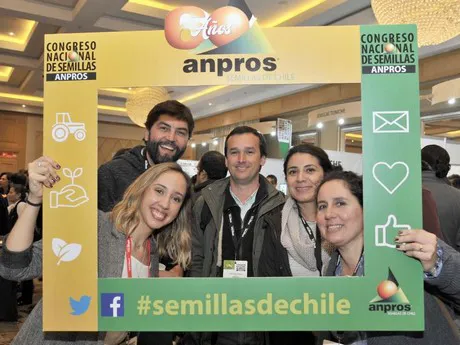Celebrating 60 years of ANPROS, seed producers and leaders focused on the current state of the industry, use of enhanced technological tools and the prevailing challenges of an economic activity that at its peak of exports created more than 70,000 jobs.

ANPROS, the National Seed Producers Association of Chile, recently held the National Seed Congress which was organized for the second consecutive year with the active participation of major stakeholders in the country's seed industry.
The Congress, which was held at the Sun Monticello Conference Center, convened more than 600 people, with the participation of the Minister of Agriculture, Antonio Walker, authorities of Chilean Agricultural Ministry-dependent agencies, agricultural sector associations, producers, exporters, advisors and academicians in order to discuss seed industry innovations from different points of view, with topics such as climate change, new technologies, new processes and the challenges and opportunities faced by the industry.
Jean Pierre Posa, President of ANPROS, talked about the current status of the industry in Chile. He claimed, “We are the first seed exporters from the Southern Cone. We want to maintain and continue with the new challenges, such as carrying out a study on the quality of our products and our position compared to the rest of the world.” The water and climate situation was not absent in this meeting. “This year we want to implement an agrometeorological service with weather stations to allow our members to have online information about the climate situation of each area of the country in which they are producing.”
In his assessment of the national agricultural sector, Agriculture Minister Antonio Walker expressed his concern about the water status. “We have water, but we are facing a dry year from Atacama to El Maule. However, I want to be optimistic, we have an irrigation infrastructure that we have to streamline, which is why we are planning the construction of 26 reservoirs,” he said. He also talked about the challenge of increasing the size of the seed industry: he claimed, "we want production to increase from 25 thousand hectares to 60 thousand hectares in different varieties. For this purpose, we also have the challenge of increasing seed certification to obtain a greater export potential for the coming years."
Michael Keller, Secretary General of the International Seed Federation, emphasized the southern hemisphere’s important role in delivering quality seed to the world. “Chile has been active in promoting consistent regulations on plant breeding innovation and phytosanitary measures at a regional and international level. In a world with increasing seed movement, our sector is looking for consistent science and risk-based regulations everywhere.” He was optimistic about the shape of the regulatory environment in the future. “I am hopeful that we will reach consistent and harmonized regulation on gene editing. We have to think that in a globalized world, countries must go toward a common path,” he said. "In 20 years, the world will vastly change. Regulations must be adapted around the progress that science has made."
On the “Field Man or Woman of the Future”, Kent Bradford, Faculty of the Seed Biotechnology Center of the University of California at Davis, conducted an in-depth analysis of the key steps for the successful production of seeds and the relevant aspects to consider in this scenario where quality seeds depend not only on agronomic factors such as climate, soil type, isolation, etc., but also on understanding how advances in plant and seed biology will affect the different production processes.
Mario Schindler, Executive Director of ANPROS, reviewed the Association’s history, underlining its milestones, especially the work with the public sector, the globally recognized evolution of the isolation system, and how it has been a platform for the growth of the sector. He added, “we export seeds all over the world, and we must be proud. We have grown during these 60 years. The seed industry is one of the noblest industries, but that has not come alone, because together with our NPPO, the Servicio Agrícola y Ganadero (Agricultural and Livestock Service), we have been working permanently to face the challenges of our industry.”
For more information: ANPROS
ANPROS
www.anproschile.cl
